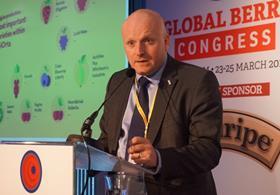
Last week, representatives from Belgian cooperative BelOrta were scheduled to travel to the UK to continue preparations for trade post-Brexit. “In the last few years, the UK has been a growing market for us,” said commercial director Jo Lambrecht, “for aubergines, peppers, strawberries, pears – a large variety of fruit and vegetables. But, of course, the tour had to be postponed.”
Covid-19 may have become the main concern for most, but the UK government’s insistence that the UK will leave the EU at the end of the year, despite the circumstances, is a worry for many.
“A lot of additional documentation for suppliers is expected after Brexit goes through,” said Lambrecht. “These extra documents and expected clearances will take valuable time in the logistical process.”
Just as we have seen during the coronavirus pandemic, it will be down to the efforts made by companies throughout the supply chain to ensure the continuation of supplies.
“It shows how much we all depend on the fresh produce industry,” said Lambrecht. “It deserves a lot of respect. Lettuce, tomatoes, apples – they are always there on the shelves. Everyone in the chain works hard to stay organised to make sure the produce reaches the consumer.”
Indeed, during the Covid-19 crisis, the fruit and vegetables sector has been recognised by governments as an essential service.
“People are counting on us to feed consumers,” said Lambrecht. “We have introduced many new measures to keep business going. All our sites are now closed to external visitors. For those who cannot work from home, including growers, quality and logistics personnel, hygiene and social distancing are crucial, as well as clear communication to colleagues, growers and customers to keep them informed about best practices. We also take care to avoid shifts crossing over and have opened new break facilities to guarantee social distancing. In many ways we have had to rewrite the script for handling procedures.”
The closure of restaurants, bars and hotels has of course had an immediate impact on business. “We have to adapt in order to ensure we get supplies to consumers,” said Lambrecht. “More asparagus is now going to the retailers, for example. After the initial bulk-buying from consumers, we are now seeing changes to when people are doing their shopping, with less of a focus on Friday. People are cooking more at home and eating more fruit and vegetables as a result. This is not just happening here in Belgium, but in many countries.”
However, concerns over labour remain an issue, with many foreign workers unable to reach the country. “In Belgium, growers just starting production are facing some major difficulties,” said Lambrecht. “The government has launched an initiative called Help de Oogst (Help the Harvest) to try to find more seasonal workers, especially for the strawberry and asparagus fields.”
Some have suggested that fears over Covid-19 might make consumers more forgiving about protective plastic packaging, but Lambrecht believes it’s more complicated than that.
“In the heat of the moment, focuses can change,” he said. “Perhaps people are looking at products in a new light. Plastic is often seen merely as a waste problem, but now the advantages in terms of hygiene and food safety are also more evident. For BelOrta this doesn’t change much. We have a strategy and we know what we believe in. We are looking for the best and most sustainable solutions for each product. We have been using rPET punnets for strawberries for many years now, but we are also investing in new sustainable packaging solutions. We must keep developing and making the right choices.”



